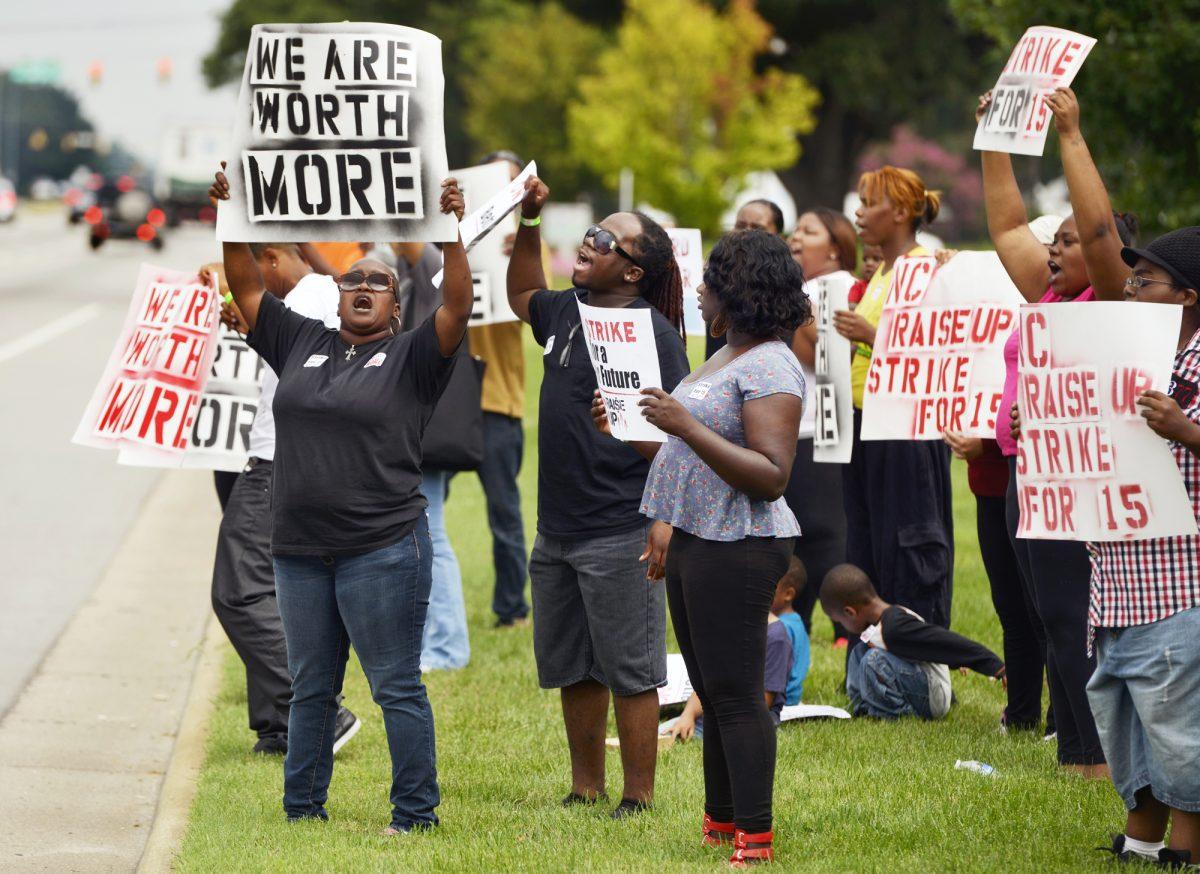 Protesters chant “Show me what democracy looks like; this is what democracy looks like,” in an attempt to earn higher wages and the ability to unionize." />
Protesters chant “Show me what democracy looks like; this is what democracy looks like,” in an attempt to earn higher wages and the ability to unionize." />
Photo courtesy of The News & Observer
Protesters chant “Show me what democracy looks like; this is what democracy looks like,” in an attempt to earn higher wages and the ability to unionize.
Fast-food workers from across North Carolina walked out of their jobs on Thursday and marched through downtown Raleigh to have their wages “super-sized.” The protest was part of a nation-wide strike organized by Fast Food Forward, a New York City-based campaign advocating for higher wages and the ability to unionize.
At about 3:30 p.m., about 150 people marched from Martin Baptist Church to a Kentucky Fried Chicken several blocks away to protest. During the march protesters chanted slogans of their movement such as “We can’t survive on 7.25” and “No more workers, no more fries, make our wages super-sized.”
The Rev. William J. Barber, president of the North Carolina National Association for the Advancement of Colored People, led the march and gave a speech upon arriving at KFC.
Barber spoke of the legacy of Martin Luther King Jr. and its relation to the equal treatment of workers and worker’s rights. He paraphrased King, saying that, “We have to remind this nation that it is a crime to live in a rich nation and receive starvation wages.”
He also addressed President Obama stating , “[the President] can sign an executive order demanding that every business that has a contract with the federal government has to pay a living wage; he could do it tomorrow.”
During his speech Barber said the $7.25-an-hour minimum wage was not only immoral but illegal. According to Barber, the current minimum wage is an act of discrimination and the Commerce Clause of the U.S. Constitution forbids those who discriminate to benefit from tax-funded infrastructure.
Barber also said that those who mistreat workers are not only guilty in the eyes of the law but in the eyes of the God as well.
“The biggest moral issue of any religion, whether it’s Christianity, Islam or Judaism, is how you treat workers and how you treat the poor,” Barber said.
Those taking part in Thursday’s demonstration expressed their desire of a living wage at $15-an-hour and the right to unionize without retaliation from employers.
Willietta Dukes, a Burger King employee, critiqued the fast-food companies who earn billions of dollars a year, while at the same time she can’t afford the proper health care to alleviate the stress put on her body from 15 years of work in the fast food industry.
Dukes said that march on Thursday and the nationwide movement to organize fast food workers gives her hope for a better future, and she will continue to fight for equality. “Where there are numbers, there is power,” Dukes said. “And don’t stand alone, we stand united.”
Ladondre Pretty, a father to five children and employee at Little Ceasars, also walked out on his job to take part in Thursday’s march.
Pretty said his involvement in the protest was necessary for him to exceed his current socioeconomic status.
“I got to fight to get to where I want to be,” Pretty said.
“I just want to be making decent money to provide for my family.”
He said that his shift manager told him about the march and that he plans to get even more of his coworkers involved in the movement.
Dante Strobino, an N.C. State alumnus and organizer for the North Carolina Public Service Workers Union, said that all fast-food workers who are taking part in the movement will not be fired from their jobs.
“It is illegal for them to be fired and we’re hoping that won’t happen, but it may happen,” Strobino said.
He went on to say that, upon returning to work, all workers involved in these protests will be reinforced by a network of community leaders and legal counsel advocating for their equal treatment and rights.
According to Strobino, only three workers out of the 3,000 involved, prior to Thursday’s event, have been arrested; all of whom have gotten their jobs back.